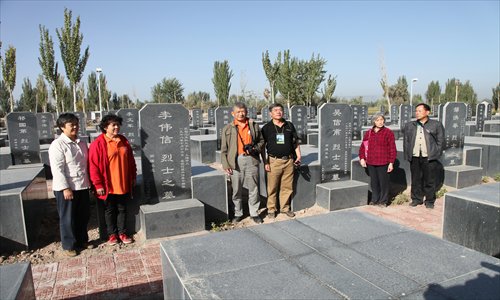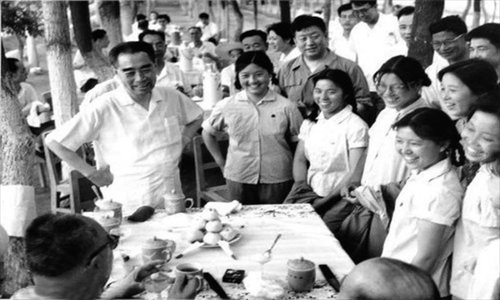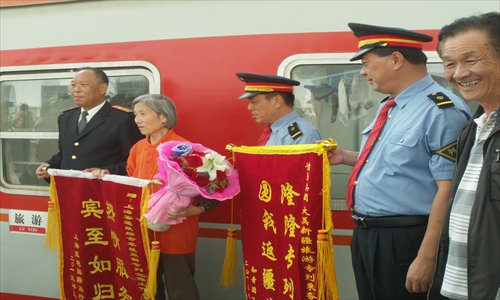Where lives were changed

On the morning of September 7 this year, 262 Shanghai middle-aged and older men and women boarded a train bound for the Xinjiang Uyghur Autonomous Region. The journey from the city to the far-flung province took them more than 60 hours. It was not the first time they had made this journey.
Some had first made this trip 50 years before in 1963. Most had traveled this route in the 1970s and for some the journey had then taken 28 days.
These men and women were some of the 100,000 Shanghai people who went to live and work in Xinjiang in the 1960s and 70s. They were the zhiqing ("the sent-down youth"), the 17 millions or so young people who went from their birthplace cities to spend years in far-flung counties and provinces.
Some of the zhiqing volunteered but most were coerced to join the "Up to the Mountains and Down to the Countryside Movement." From the 1960s to the end of the Cultural Revolution (1966-76) these teenagers became laborers in the countryside "undergoing re-education by poor peasants" as the then chairman Mao Zedong phrased it. Most left school when they were 16 but some were aged 14. Others were in their 20s and had some work experience - most of this group had volunteered.
After the Communist Party of China ended the rustication movement in October, 1980, tens of thousands of young people left the farms they had been working on to return home. For most of the people on the train last month this was the first time in more than 30 years they had visited the region where they had spent an influential part of their lives.
Natural beauty
They had two reasons for their visit: they would return to the farms and villages where they worked; and, for the first time, they would get to see some of the natural beauty of the region.
Most had never seen the parts of Xinjiang that have become famous as "must-see" tourist venues. For them, as they told the Global Times, Xinjiang was a workplace and their lives were restricted to the farms where they labored. Those were the days when everyone worked a six-day week, single people were given a 56-day paid leave every three years, and married people had a holiday once every 10 years. These holidays were always spent visiting Shanghai.
For the Shanghai visitors the 22-day trip - they spent 16 days in Xinjiang itself - was a dream come true. There is a Chinese saying that "it's a tragedy to go to Xinjiang and not set foot on Kashgar and Yili." For these travellers there's now no tragedy involved. As well as seeing Kashgar and Yili, they stopped over in the capital Urumqi.
It was not that they had never intended to return to Xinjiang. But for these retirees a return journey between Shanghai and Xinjiang in summer (most can only travel then because they look after grandchildren) was difficult to organize and costly - a single train ticket to Xinjiang costs at least 2,000 yuan ($327.20).
An offer from a Shanghai travel agent and assistance from the government helped make the September tour possible and affordable. The return journey, accommodation, and admission to some sightseeing venues set each traveler back less than 5,000 yuan.
The last of the Xinjiang zhiqing returned to Shanghai in August 2009. Sixty-something Jiang Wanfu is tall and softly spoken and for him the journey was the first time he had seen Xinjiang beyond the township of Yecheng, on the borders of India and Pakistan - even though he had been working there as a surgeon for 43 years.
"I had passed through eastern Xinjiang by train but that was all - so Turpan with its famous Flaming Mountain and Grape Valley were just the names of train stops. Everyone says Xinjiang is one of the great scenic areas but after 43 years of being a Xinjianger I was almost clueless about it. The trip there was wonderful - I fulfilled a lifelong wish," Jiang told the Global Times.
But for Jiang the strongest impression of the journey was seeing how underdeveloped Xinjiang was compared to the east coast. While farmers and farm workers are better off, and these days cotton and dates are being grown in the region which also has a prosperous mutton industry, Jiang found there had been only a slight improvement in living standards.
Remarkably prosperous
While the cities in the region were looking remarkably prosperous with skyscrapers and cars, life outside the cities was still grim. "In the Kunlun Mountain area, the farmers and farm workers are not hungry all the time like they used to be but that's way below the living standards of the rest of the country. This reinforces how important it is to keep funding and developing the West, and reminds me how far we need to go in order to help Xinjiang catch up with the rest of the nation," he said.
Unlike most of zhiqing, Jiang chose to stay in Xinjiang until retirement instead of returning to Shanghai in the 1980s. He said this was a practical choice. He had married a zhiqing girl in 1972 and they had had a child. His father in Shanghai had died in 1971 and his mother was being cared for by his three older sisters.
"Going back to Shanghai meant starting all over again and this was unrealistic for a man aged over 30. My sisters and their husbands were willing to have me live with them and cover my living expenses, but I couldn't stand relying on other people for shelter and food."
He enjoyed his career in Xinjiang. "It was after I arrived in Xinjiang that the corps (which administered the zhiqing) got me to study medicine and later qualify as a doctor. In Shanghai where there were so many good doctors, I would have been nothing, but over there I was of use and people always came to me where there was a medical emergency. I would have been an extra in Shanghai."
Most of his colleagues at the little clinic he worked in - the physician, the obstetrician and the technician - were also zhiqing but they all left Xinjiang in the early 1980s. At that time some of the villagers were crying as they held his hand and asked whether he would also be leaving them.
"They asked what would they do if they got sick again. With the others gone, I knew the clinic would have to close if I also left. I couldn't bear the thought of that. Although life there was poor and difficult, I believed I had to help people."
On the trip back to Xinjiang, hundreds of Jiang's old patients came to greet him and thank him. Many families had three generations who had been treated by him. "Being remembered like this is satisfying. I feel that this has not been a worthless life," said Jiang.
He said the general feeling in Xinjiang was that the Shanghai zhiqing had brought knowledge, modern civilization, and modern thinking and ideas with them. "We had found our places there and made contributions."

The volunteer
Yang Yongqing was one of the key organizers of the September trip and one of the earliest zhiqing from Shanghai to go to work in Xinjiang. In 1963, she rejected an offer to go to Hong Kong where her family members lived in, quit her job as a sales assistant in a radio shop, and volunteered to go to Xinjiang. She arrived in Shihezi in northern Xinjiang and began working on farms and teaching.
When the then premier Zhou Enlai visited Shihezi in July 1965 Yang was his escort. When Zhou learned that she had come from a well-off family and travelled thousands of miles to help the nation's outskirts, he remarked that it would have not been easy for her.
"Once when some Shanghai zhiqing planned to leave and found out I wanted to stay they were unhappy and said I was just trying to look good. But I wasn't. I thought that since we had come to help construct the country's far-flung areas, we should stay and do that. And after Premier Zhou had encouraged me, I had more reasons to stay," the 74-year-old said.
During the Cultural Revolution, the scarcity of oil was a big problem where Yang worked and lived, and each household was allocated just 3 liters of oil a month. But in the late 1970s, Yang helped promote sunflower oil across northern Xinjiang and was gratified to be told some time later that there was more oil than needed.
In 1981, Yang began to work at the Science Association in Urumqi. She had always had an interest in science and technology, and realized the importance of encouraging this interest in school children. She organized lectures, competitions and exhibitions at schools all over Xinjiang.
"The project's yearly allowance was a mere 50,000 yuan and it was way more difficult to do this work in Xinjiang than in Shanghai - the many different ethnic groups meant different translators had to be involved constantly," she recalled.
On a work trip to a county in 1996, she was in a car accident and suffered a neck injury which led to her retirement from work in the region. In 1998, she returned to Shanghai, where her daughter and son had been living since 1988 (a 1986 regulation gave the children of zhiqing the right to hukou, or household registration, in their parents' hometown).

Retired life
Both Yang and Jiang are getting pensions from Xinjiang although these are considerably less that they would have received from working in Shanghai. But Jiang considers himself "very lucky." He said that when he did return to the city, the Xinmin Evening News helped his daughter find a job at a Traditional Chinese Medicine hospital in Minhang district, and the city government allocated him a two-bedroom apartment in Baoshan district and gave his second wife a Shanghai hukou. "Shanghai has not forgotten me. It feels good to be back," he said.
Yang, who now lives with her daughter in a three-bedroom apartment, said she had been very contented. "I always tell my daughter how we used to live in dingy places that leaked whenever it rained. I never dreamt I would come back to Shanghai. Now I have an apartment, medical insurance, and a pension, and she has a stable job. This is enough."
But for some zhiqing there has been no pleasant resettlement in Shanghai. Zhang Weiming is the leader of a group of zhiqing who have been campaigning for compensation since 2004. Every Wednesday they demonstrate in People's Square demanding that the municipal government increases their medical benefits and pensions to match Shanghai allowances and pay compensation of 10,000 yuan for each year spent at Xinjiang.
Because a number of the zhiqing began to work there before the age of 16, the group also asks for compensation for those who started working in the region before they were aged 16.
The campaign has not been met with a response from the authorities to date - insiders say the demands are regarded as too high.
The 50th anniversary of Shanghai-Xinjiang zhiqing will be celebrated with a conference and gala event at the Shanghai Indoor Stadium on October 22. So far 8,500 people, including many of the zhiqing, have registered.